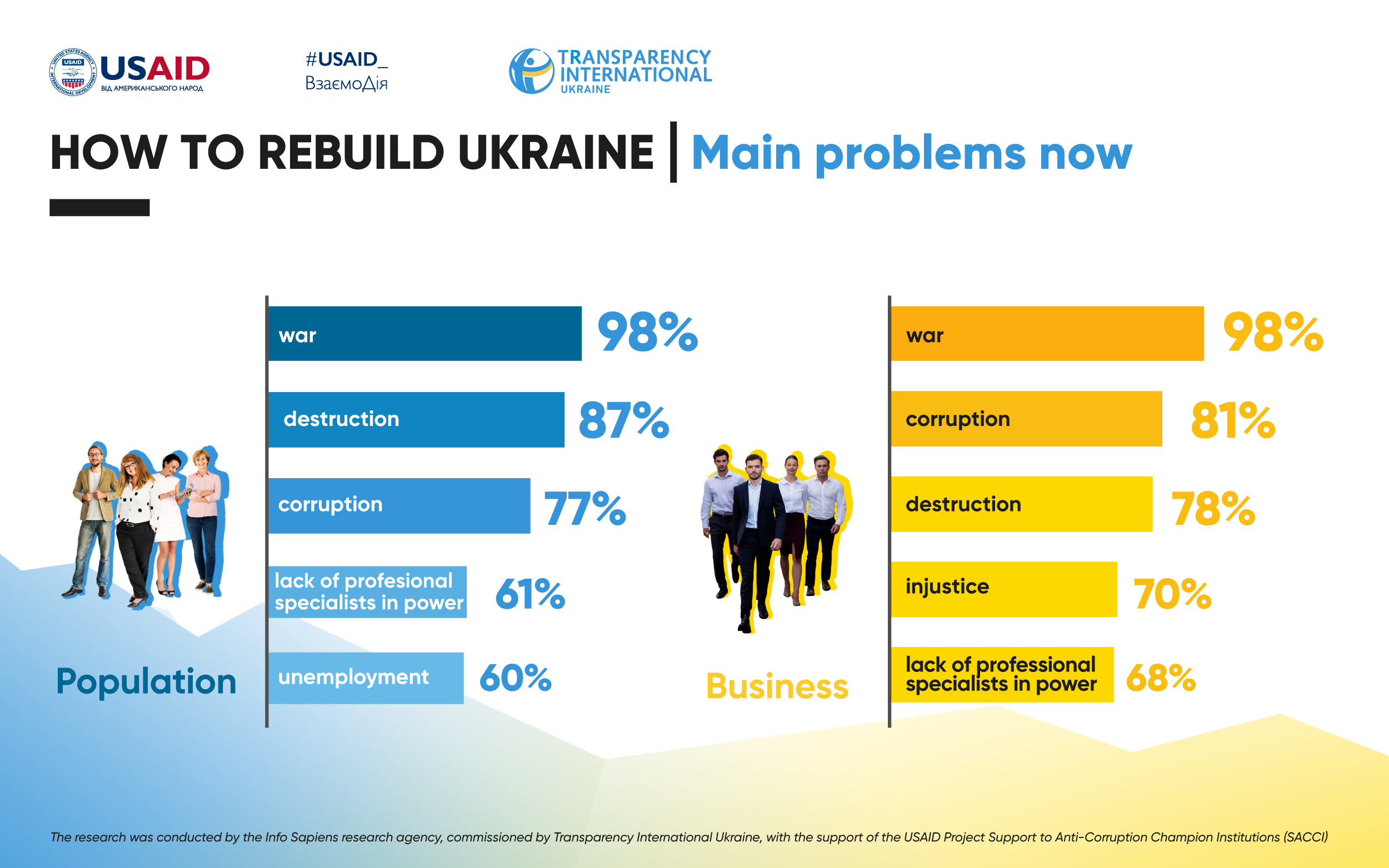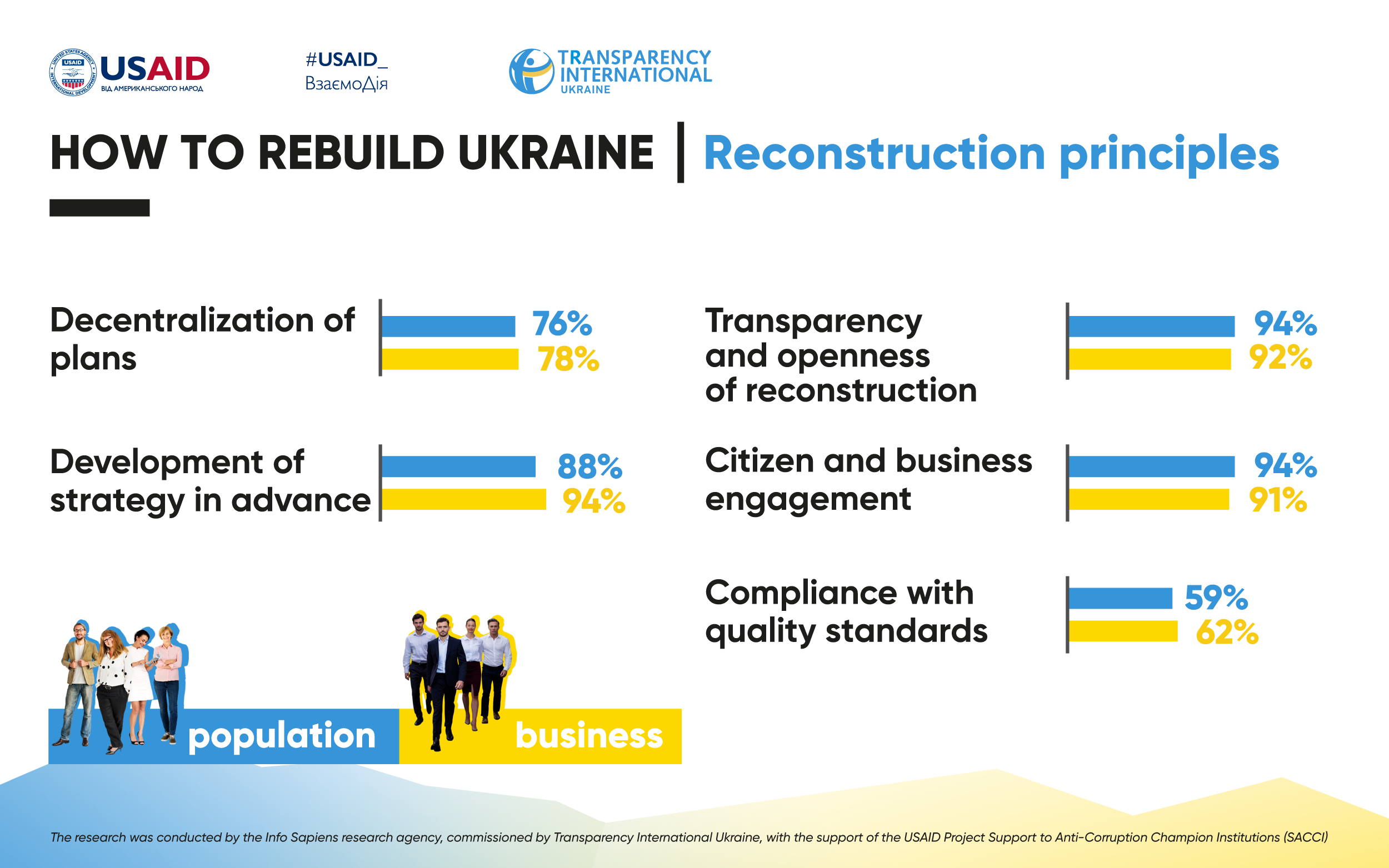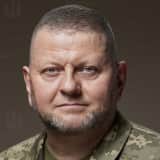Demanding and mature: expectations of Ukrainians regarding future reconstruction revealed
Since the beginning of the full-scale invasion, Ukrainians have consolidated, united, forgotten about all internal squabbles for a while to join in a single burst of struggle with an external enemy. Various studies have demonstrated an unprecedented level of support for the authorities and approval of how and where the country is moving.
However, time passes, threats change, events in the country unfold, the severity of their perception increases, while discontent and fatigue accumulate. Eventually, there is a lot of disappointment in many aspects. And it is the way society feels and acts in such periods that can testify to the level of its maturity and demonstrate how it has progressed.
Now it is no less important to preserve the social health of Ukrainians than to save the country. Therefore, measuring public opinion and considering it when making socially significant decisions is becoming increasingly relevant. And since the issue of reconstruction after unprecedented destruction is a crucial component of the country's future, we wanted to understand what expectations and demands the society formed on this part of the way.
That is why Info Sapiens conducted a sociological study of the expectations and fears of Ukrainians and business representatives in the processes of future reconstruction, commissioned by Transparency International Ukraine with the support of the USAID Project Support to Anti-Corruption Champion Institutions.
The survey was conducted in March-April 2023, so it did not cover the consequences of terrorism at the Kakhovka HPP. At the same time, it undoubtedly indicates the general mood and wishes of the society today and should ultimately determine the specific steps of the state. The study also shows in which aspects we have really matured, and where we still have something to learn.
Here are a few interesting discoveries I have made.
1. Corruption is seen as the main challenge and threat to the development of the state
Traditionally, Ukrainians consider corruption to be among the three main problems. For us, those who have been working with this topic for many years, it is no surprise, but it is symptomatic that this trend persists even in times of the full-scale war.
In general, Ukrainians consider the war (100%), destruction of infrastructure and housing (98%), as well as corruption (94%; 77% as very serious and 17% as serious) to be serious problems. The residents of the west of the country consider the problem of corruption to be especially acute.

In addition, when asked whether they have doubts that the recovery plans would not be implemented properly, more than half of Ukrainians expressed their fears about the restoration of corruption schemes (73%) and the embezzlement of funds due to lack of control (68%). At the same time, 45% of respondents mentioned that the threat of resumption of hostilities could disrupt reconstruction plans. That is, after the victory, Ukrainians fear corruption much more than war.
Personally, for me to realize this was very scary. Because this once again emphasizes the complexity of the dual task set before us — not only to win the war, but also not to lose the country of the future.
But it can also be considered a kind of marker of a mature society. In fact, younger and more active people fear that the price paid — the lives lost, the destruction, the suffering of the people — would not be in vain. Ukrainians want our society to turn the crisis into growth. They look beyond the horizons of war. And this is, undoubtedly, great.
2. The European future is not only about values, but also about the quality of life — Ukrainians want to rebuild "better than it was"
"Reconstruction" is almost a magical word. Everyone is able to interpret and does interpret it in their own way.
For some people, this means restoring their lost housing, for others — the plant where they worked. It is important for someone to return to the city or village which they left. And someone expects that as part of the reconstruction, roads will be built that have never been built before.
But one thing is certain — Ukrainians want and believe in a life "better than it was."

The vast majority (88%) believes that Ukraine should develop plans and strategies for reconstruction now so as not to waste time after the victory. At the same time, 97% of respondents believe that before starting reconstruction works, it is necessary to develop and record strategic plans for reconstruction in the regulatory documents. And it is undoubtedly quite a mature and thoughtful vision.
There’s more to come. According to the population, when choosing contractors for reconstruction works, it is necessary to focus on the quality of works, their compliance with global standards and experience, and not to consider only the price and speed.
At the same time, planning and reconstruction should not be postponed! 59% of Ukrainians are convinced that housing for those who lost it should be built now, and not wait for major construction after the victory. And here, of course, the primary attention should be paid to the restoration of the critical infrastructure of the country, houses come second. This is what the majority believes.
That is, Ukrainians, though inclined to believe in the "magic wand," think more and more pragmatically. They understand that the reconstruction will last about 10 years – 60% of respondents said this. And with all their desires, they see the risk that "better than it was" may not happen, so it is necessary to at least recover to the pre-war level – 77% of respondents partially or totally agree with this.
Having seen these figures, I got the feeling that, to a certain extent, Ukrainians are ready to endure some inconveniences now to have a better result in the future. But everyone can have their understanding of the form of this "better," so the engagement of citizens, communication with the population both at the national and regional levels will be in great demand during the reconstruction. The mediation of conflicts and the search for consensus solutions are already becoming crucial tools for interaction between the authorities and the population.
3. There is a risk of painful disappointments
However, let us not be deluded that Ukrainian society is devoid of infantility and is already sufficiently conscious and mature. The fact is that, in general, the population demonstrates a rather weak idea of the responsibility and role of various social institutions in the future reconstruction.
How should this process take place according to Ukrainians?
- The President of Ukraine should attract funding, control costs, and set tasks for reconstruction works.
- International organizations and donors should attract funding and pay for reconstruction.
- Independent auditors and expert groups should monitor costs.
- International business must attract financing and provide reconstruction.
- Local authorities are also obliged to attract funding and pay for reconstruction, as well as set tasks and be responsible for the final result.
- And the duties of the legislative and central executive authorities, together with the local community and activists, include setting tasks and responsibility for the final result.
At the same time, the vast majority of citizens believe that their engagement in public discussions is necessary and important. However, this is probably mostly a declarative desire, and it is unlikely that many people will participate in a professional discussion on reconstruction plans.
But, again, these results indicate that a high awareness of the population about the course of reconstruction, responsible persons/institutions at different stages, the completeness and frequency of dialogue with the population should become an integral part of the work of the authorities. Given a low level of trust in various government institutions, raising awareness, regularity of informing and engaging citizens in decision-making are essential for the society to mature.
How realistic are the recovery timeframes? What are the necessary, and what are the achievable amounts of possible funding? Are the mechanisms for citizen and business engagement sufficiently transparent? How clear are the ways of influencing decision-making, explaining the existing priorities in the recovery work?
All these questions need to be explained, discussed, debated. Unless this is done, even with really high-quality results of reconstruction, Ukrainians will have a feeling of dissatisfaction, and even disappointment or indignation.
***
Difficult decisions are never perceived unambiguously. In conditions of the war and acute reactions, it is important to understand the context and reasons for the decisions taken and be able to influence the result. This is almost the only possible tool for preserving a democratic, European, and relatively healthy, albeit extremely traumatized society.
We have become demanding, but this demand is not just a desire to have more of something and better. We realize that the potential "better" is being fought for at the cost of the incredible efforts of everyone who goes through this difficult path of struggle for the independence and freedom of the country. Our demand is dictated by a profound rethinking that "the people are the bearer of sovereignty and the only source of power in Ukraine." And this is not a standard sentence from the Constitution, but how everyone really feels.
Over the past 16 months, Ukrainian society has been forced to grow up quickly, and this, in turn, has formed its new, sharper, and unexpected requests. And they must be reckoned with – both at the level of the enterprise personnel or the community of the city, and on the part of the authorities. This, though inconclusive, but still "maturity" comes with great pain and losses.
The maturity in the form of awareness of one's civic influence still borders with sharpness and high demand. But Ukrainian society is clearly demonstrating its agency and focus on results. And that is to be reckoned with. These are the rules of mature society, which we, apparently, are already becoming.
Anastasia Mazurok, Deputy Executive Director for Operations, Transparency International Ukraine






